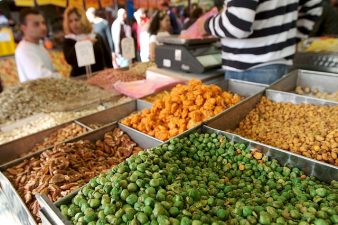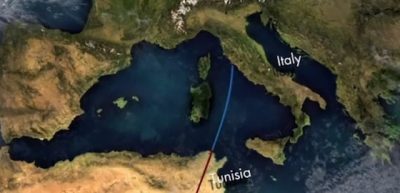 Officials in Abu Dhabi launched the “Think before you waste” campaign to help prevent food from piling up in landfills during Ramadan
Officials in Abu Dhabi launched the “Think before you waste” campaign to help prevent food from piling up in landfills during Ramadan
While Muslims are encouraged to internalize the principles of charity throughout their lives, during the ninth month of Ramadan, this philosophy is kicked into overdrive. Muslims demonstrate with even more intensity their devotion to Allah by abstaining from food, excessive sleep, and material pleasures. But each night, after the sun sets behind the mosque, dining rooms throughout the Arab world are transformed. Several recipes are realized in heaps, and guests are encouraged to pile up their plates. The more food, the greater the family’s generosity. Unfortunately, there’s a dark side to this abundance.
The 500 tonne elephant in the room
In a report for The National, Vesela Todorova describes how the United Arab Emirates (UAE) throws away 500 tonnes of food each year during Ramadan. This worries officials with the Environment Agency of Abu Dhabi (EAD), not just because precious resources used to create and distribute said food, such as energy, water, and packaging are wasted, but also because of that waste’s environmental impact.
“Food waste contributes to climate change, since food rotting in landfills produces methane, a powerful greenhouse gas,” Abdulnasser al Shamsi, EAD’s executive director, told Todorova. He also said that cooking less and stacking less food on the plate are two ways that this waste can be reduced.
Think before you waste
To combat the problem, the EAD has launched a campaign called “Think Before You Waste,” but al Shamsi is not optimistic that such ingrained cultural practices can be sloughed off with an environmental mandate. A religious mandate, on the other hand, may be more successful.
“The General Authority of Islamic Affairs and Charitable Endowments (Awqaf) is also taking part in the campaign, communicating with imams to ensure that the message to be moderate with food is part of the first Friday prayer of Ramadan,” writes Todorova.
All things in moderation
The Qu’ran celebrates food and drink, but excess is strongly discouraged. Drawing attention to this may also mitigate the unwitting social and environmental impact uneaten food has on Arab communities.
In Abu Dhabi, the Hefth Al Ne’am charity established in 2004 has also created a program that collects leftover food at large hotels and other functions. Though their standards are high – no food that has been touched or that has been exposed to outside temperatures can be used – what food they are able to collect is diverted from the landfill to the mouths of hungry people.
“It is a commendable initiative,” according to Fayaz Samsudeen, the assistant director of food and beverage at the Shangri-La Hotel Qaryat Al Beri. “People can enjoy festive buffets and functions responsibly by knowing what they want to eat, and having a sound sense of awareness about their limits – you don’t want your eyes to be bigger than your stomach.”
:: image via ccarlstead and story via The National
More on Ramadan:




Comments are closed.